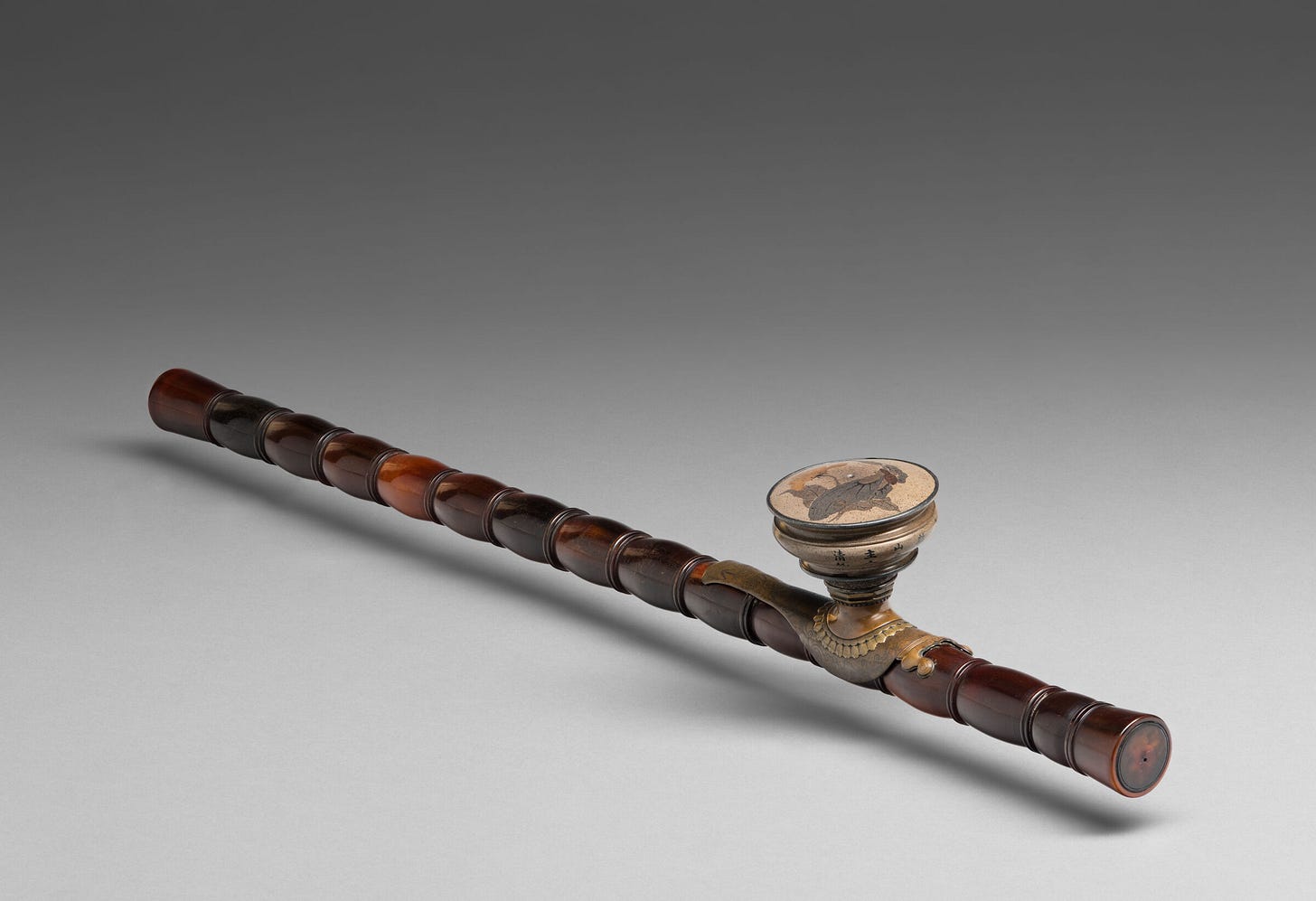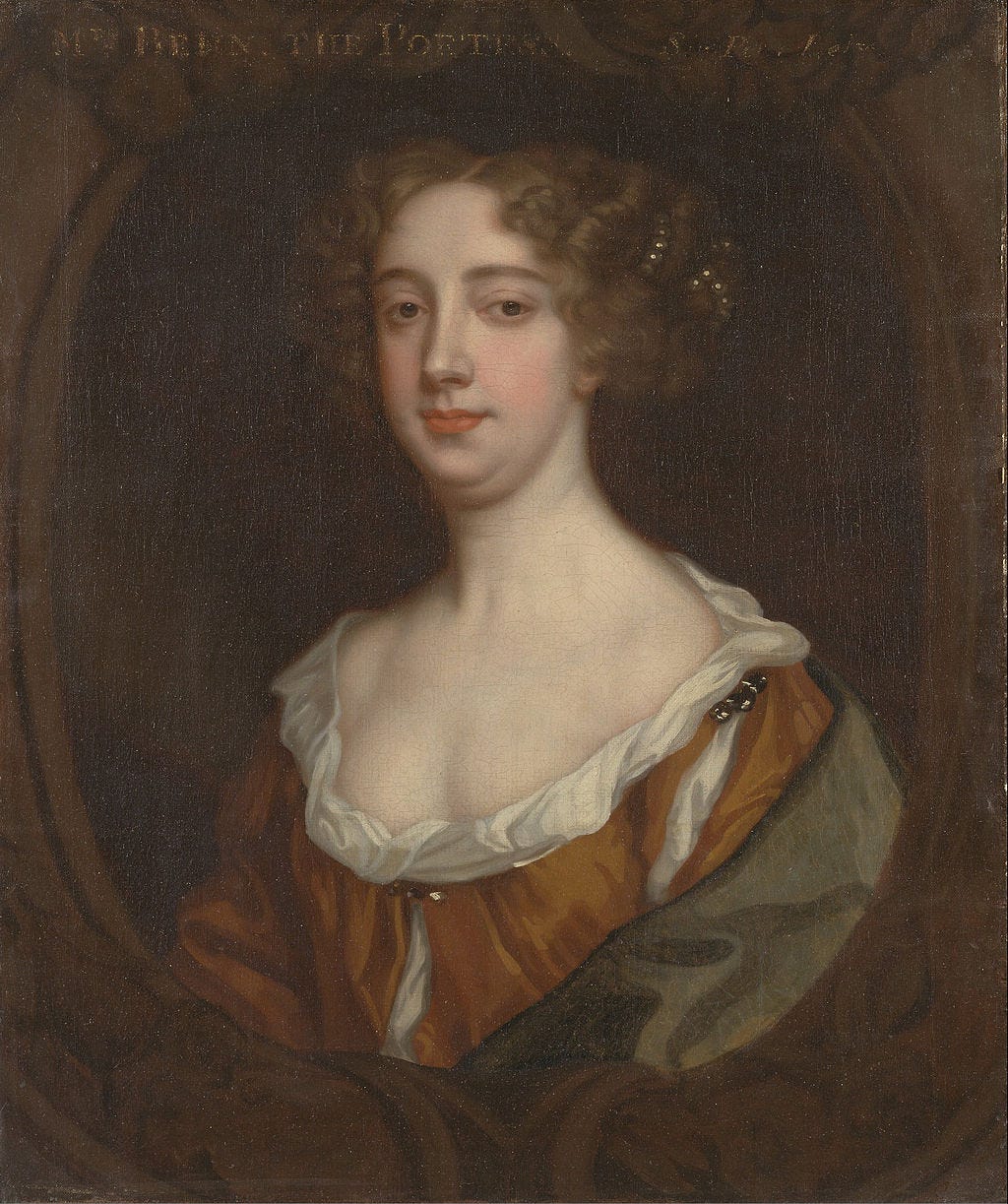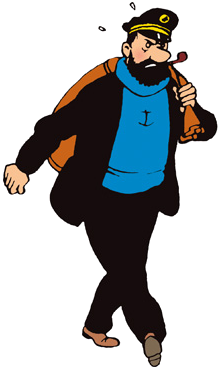She was a poet, a playwright, and a spy. She may have traveled as far as Surinam and was probably a Catholic, certainly a Jacobite. A woman of spirit, largely self-educated, enticingly described by her Wikipedia page:
Writer Germaine Greer has called Behn "a palimpsest; she has scratched herself out," and biographer Janet Todd noted that Behn "has a lethal combination of obscurity, secrecy and staginess which makes her an uneasy fit for any narrative, speculative or factual. She is not so much a woman to be unmasked as an unending combination of masks." Her name is not mentioned in tax or church records. During her lifetime she was also known as Ann Behn, Mrs Behn, agent 160 and Astrea.
This is Aphra Behn, one model for the character of Mrs. Louisa Wogan, as described by spymaster Sir Joseph Blaine; Stephen Maturin replies, with uncharacteristic obtuseness, “Aphra Behn, the lewd woman that wrote plays in the last age?” Blaine corrects him: “As to morals, I have nothing to say, but she was first and foremost an intelligence agent…. For intelligence, there is nothing like a keen-witted, handsome woman” (Desolation Island 56). Mrs. Wogan is an American spy, “the Behn of Philadelphia. She too turns an elegant verse, and she writes a pretty play” (57). But this Behn has been caught in the act and had her sentence commuted from hanging to transportation to Australia. She is also an acquaintance of the love of Stephen’s life, the elusive Diana Villiers, and she looks just like her—”a leopard to Diana’s tiger,” Stephen thinks after meeting her, but “smaller in any case: on a smaller scale” (95). Stephen subsequently devotes a good deal of mental energy to denying their resemblance, and we must ask ourselves why.
Stephen’s skills as both surgeon and spy have been flagging as a direct result of his addiction to laudanum, which is in turn a symptom of his hopeless pursuit of Diana. Sir Joseph Blaine sends him along with Mrs. Wogan and a parcel of other convicts on HMS Leopard, under the command of Jack Aubrey, to Botany Bay. It’s a kind of working vacation for Stephen; cooped up with Mrs. Wogan he’ll have every opportunity to find out what she knows, even as thousands of miles of salt water are expected to have their usual healing effect. There is never any more fraught situation in these novels than when a woman comes aboard—it always brings a tear of misogynistic invective to Jack Aubrey’s lips. But the danger she poses is moral, and not in the usual sense of sexual morality. It is the arc of Stephen Maturin’s moral career that Mrs. Wogan will bend.
Louisa’s laugh is infectious: “a gurgling laugh that went on and on, so deeply amused, so natural and so absurdly fetching, that [Stephen] felt his mouth broaden” (111). Jack, on hearing it, reflects in a letter to Sophia that “I never heard Diana laugh, that I recall. At least, not wholeheartedly, like Mrs. Wogan” (125). It is perhaps that wholeheartedness that makes Louisa not only a lesser Diana, but a poor spy. Stephen addresses her as “child” in conversation, though there is probably less than a decade between them. This is condescending, but also a form of manipulation, a kind of shield against her sexuality. He finds her easy to manipulate, in part because he has a ready tool to hand: a lovestruck young American named Michael Herapath, a scholar of Chinese poetry, who has stowed aboard HMS Leopard to be near Louisa. Maturin enlists him, unwittingly, in a scheme to pass along a poisoned dossier to his lady love, and in the next novel, The Fortune of War, we learn that the gambit has had spectacular success, playing havoc with the French system of intelligence that is Stephen’s bitterest foe and leading to any number of executions. He brings about this coup by engineering their escape from the horrible old Leopard to the La Fayette, an American whaler. It gives the novel’s concluding paragraph an ironic tinge:
The boat came nearer still, passed within whispering distance, and the moon shone on their faces, delighted, ingenuous, and absurdly young. It passed on; swung into the black shadow of the whaler’s side. Some low cries from the La Fayette – ‘Get a good hold on the lines, ma’am, and mind your petticoats – easy, all, as she rises’ – and then, as the brig swung to the breeze and gathered way, Mrs Wogan’s laugh, floating clear across the water, very cheerful and amused, more amused than ever, so amused that both Stephen and Bonden chuckled aloud; and now, for the first time, it had a fine triumphant ring. (325)
The real triumph is Stephen’s; he has turned this strangely “ingenuous” spy into a weapon. When in the subsequent novel, The Fortune of War, she meets him again in in Boston, the only damage she seems to have suffered from his manipulations is to her pride. Not suspecting Stephen in the least, she laughs at her own naïveté: “She began to laugh, low and then fuller and fuller, so amused at the backward sight of herself, ridiculously pleased and proud of her poisoned documents” (Fortune 178). Stephen is nearly undone by that laughter: “she might be an inept intelligence-agent, but he admired her dash and courage, he loved her acute, her wonderfully rare sense of humour, he had a real affection for her, and, at present, a distinct carnal inclination for her person.” He is moved by the vulnerable candor of Mrs. Wogan, so alien to good intelligence work, so necessary for intercourse of the really human sort. He also likes "her dash and courage,” her most Diana-like qualities—qualities that the novels tend to associate with masculinity. Unlike Jack Aubrey, drawn to conventionally feminine women with generous bosoms and a submissive stance, Stephen Maturin prefers his women to be a touch androgynous. In that, they are a little like Stephen himself.
Desolation Island, as I’ve said before, is a novel about addiction, and this appears most clearly in Stephen’s dialogue with Louisa’s lover, the young American translator of Chinese poetry. If Louisa Wogan is Diana on a smaller scale, so too is Michael Herapath—a slight, scholarly, dreamy young man comically inept in boats—something like a miniature Stephen. In spite of his lack of medical training, Herapath becomes the de facto surgeon’s mate of Stephen after a fever carries off a third of the crew of the Leopard, and they have a conversation about opium, from which a testy Maturin has spent much of the novel trying to abstain. He is stunned by Herapath’s revelation that he, too, is a user of opium (smoking rather than drinking it in the form of the alcoholic tincture of laudanum), and that, like Stephen, he has used it to assuage the pain of unrequited love. But Herapath claims to have broken his addiction: “I can look upon my pipe with a mild, affectionate regard; it is no longer the malignant, evil, necessary monster that once it was; and I take it – or should I say I took it, since it is now some five thousand miles away – from its place perhaps once a week, like the mechanic with his beer-can, for mere pleasure” (190).

The destructive power of addiction is a major theme of the novels, but drugs and alcohol are only its most commonplace objects; addictions to fixed ideas of oneself and others are much more dangerous, and the most dangerous addiction of all is the addiction to authority. Stephen, something of an anarchist at heart, is frequently preoccupied with the dangers of authority and its corrosive effects on a man’s humanity; he closely monitors Jack—his patient as well as his friend—for signs of such corrosion throughout the series. He is all too aware of his own predilection for addictive substances; “There is some inherent imbecility in my will. No sooner have I rid myself of one addiction, than I plunge into another. How I long for my cheroot! I will return to snuff” (Fortune 62). But how aware is Stephen of his profound addiction to authority in its most covert, insidious form—the intelligence work that tempts him to play God?
Whatever we might say of authority—justly wielded by Jack Aubrey, or abused by the likes of flogging captains such as Corbett from The Mauritius Command—it is always visible. But Stephen’s intelligence work, by its nature, is invisible, perfectly in keeping with his secretive character, and authorized less by the state than by his own righteous hatred of Napoleonic tyranny. He likes Louisa Wogan, and has genuine esteem for Michael Herapath, but he manipulates them without much scruple for the possible consequences of his actions on their fates. Yet Stephen is sometimes sickened by the lack of candor that his addiction to secret manipulation requires: “For many, many years he had been unable to open his mind fully to any man or woman at all, and at times it seemed to him that candour was as essential as food or affection: during most of this period he had used his diary as a kind of surrogate for the non-existent loving ear – a very poor surrogate indeed, but one that had become so habitual as to be almost necessary” (Fortune 199). The diary is a palliative measure, like methadone. It cannot cure the essential isolation of intelligence work, which is killing Stephen as slowly but as surely as his addictions to opium and to the cruel, fickle, endlessly alluring Diana Villiers.
Mrs. Wogan, that lesser Aphra Behn, is a foil to Diana, but in not quite the same way that Lord Clonfert and Dr. McAdam, from The Mauritius Command, are foils to Jack and Stephen. She exists not to illuminate the depths of Diana’s character, but of Stephen’s: he ruthlessly converts her subjectivity (her American patriotism, her sexuality, that wondrous laugh) into an object, a weapon for his own purposes. He refrains from having sex with her, but that doesn’t make his treatment of her any less questionable. His relationship with Diana has a sadomasochistic quality, casting Diana in the role of sadist and Stephen in the role of masochist. Certainly on some level he seems to enjoy the harrow she puts him under (and the excuse it gives him for taking heroic doses of laudanum). But Stephen has sadistic qualities of his own; his manipulation of Mrs. Wogan clearly gratifies him in a libidinal way. Is he taking revenge on Diana by using Mrs. Wogan as her proxy?
The Louisa Wogan of The Fortune of War is a less attractive figure than the damsel in distress she plays in Desolation Island. In the earlier novel she’s affectionate and maternal, knitting a comforter for Dr. Maturin and caring for Leopardina, the baby born on the voyage. In the later novel she’s largely indifferent to her own baby, Caroline, ultimately abandoning her and Michael to become the mistress of the cruel spymaster Johnson, a slaveholding Southerner like herself. It’s as though Stephen’s manipulation of her in the earlier novel has to be justified, retconned.
Unlike Mrs. Wogan, Diana resists being Stephen’s object in every way—even after they are married she refuses to play the conventional role of wife. It takes a long, long time for their relationship to shift to a basis of something like real vulnerability toward one another. Stephen is addicted to his idea of Diana; as I said earlier, he has distinctly masochistic tendencies. Diana, however, is not really a sadist—I don’t believe she takes pleasure from cruelty.1 If Stephen is addicted to her, she is addicted to her own independence, concretized in the form of the diamond necklace given her by Johnson, the chief jewel of which is named the Blue Peter, after the traditional flag raised by a ship to indicate that it is outward bound, free. But Diana does not know how to laugh, especially not at herself, the way Louisa does. She does not know how to gracefully give way to her own need for Stephen, and her desire for him—it will take many, many more books before that happens, if it really happens at all.
Aphra Behn knew how to laugh, as her ribald and witty Restoration comedy The Rover or the Banish’d Cavaliers, proves. In that play two Neapolitan sisters, Florinda and Hellena, outwit the fathers and brothers who would have one committed to a nunnery and the other married to an ugly old man. Florinda is determined to marry the man of her choosing, one of the banished cavaliers of the title, while Hellena uses her wits to engage the affections of the titular rover, Willmore, a rake modeled on the notorious Earl of Rochester. Like one of Shakespeare’s comedies, it’s crammed with cross-dressing, mask-wearing, and mistaken identities; it also has more than one scene of attempted rape. Hellena is the witty sister who goes after what she wants, frequently dressed as a boy; Florinda is the virtuous sister who endures more than one sexual assault before achieving the conventional happy ending with her English cavalier. I rather doubt that O’Brian intended any explicit comparison between Behn’s female characters and his own, but they do seem to suggest how far—and no farther—feminine wit, dash, and endurance can carry a woman through a man’s world.
Stephen manipulates Louisa, just as he has been repeatedly “ill-used” by Diana, in pursuit of whom he risks everything. Yet in spite of his devotion to masculine reason and science, he is more like them than he realizes. Is there not something feminine about how Stephen tends to achieve his aims, covertly rather than openly wielding power? Like Hellena, he plays many roles as physician, lover, duellist, naturalist, spy, and friend; like Florinda he endures violation, though in his case he is also the violator, for his addiction to secrecy threatens to destroy the vulnerability that makes human life worth living. Throughout the series we hear about Stephen’s strange laugh: “the unpleasant creaking noise that was his nearest approach to a laugh” (Mauritius 57); “the creaking sound that was his nearest approach to laughter” (Desolation 19); “Stephen uttered his rare discordant creaking laugh” (The Yellow Admiral 179). Stephen can laugh, and he certainly has wit, but not without a certain bodily constraint.
It’s a commonplace to say that these books are about men, and so they are. But men are various creatures, and the most interesting among them are the men who, rather than deny their feminine side, explore it. Louisa Wogan is one of the rare women who leads Stephen into contact with his own feminine vulnerability. Clarissa Oakes will be another.
Diana turns out to be fully capable of “whole-hearted” laughter, whatever Jack may think, as we discover in a delightful episode from The Surgeon’s Mate:
Early he was, but to his astonishment he found her there in the drawing-room before him, an exquisite sight in filmy blue and a blaze of diamonds, those in her hair making her look taller and slimmer than he had ever known her – the new French fashion suited her extremely well. ‘Upon my word, Villiers,’ he cried, ‘you look very fine.’
‘So do you, my dear,’ she replied, laughing with a whole-hearted merriment rare in her, a pure and kindly merriment that gave her face a far sweeter expression than it usually wore. ‘So are you – a beautiful, beautiful coat, and such undeniable breeches. But Stephen,’ she said, leading him to a mirror, ‘pray look in the glass.’
He did so, and a grim reflection peered back at him, a small round close-cropped head, its sparse hair standing straight up like the bristles on an old worn-out scrubbing-brush. ‘Jesus, Mary and Joseph,’ he said in a low inward tone, ‘I have forgot my wig.”




Splendid stuff!